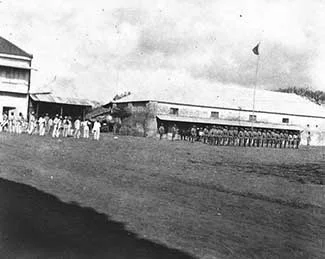Francisco Rubio and his Recruitment of Rebel Soldiers in Tanauan in 1900
On 24 October 1900, one Francisco Rubio was arraigned and tried for charges of “being a spy” by a military commission convened in the town of Tanauan in Batangas1. The trial was presided over by Major John H. Parker of the United States Volunteers 39th Infantry Regiment, with 1st Lieutenant Edward H. White acting as judge-advocate2.
Rubio was said to have entered the town wearing white clothing, not the typical uniform of the rebel forces, to “observe the drills, exercises and inspections of the troops of the United States there stationed.” He was said to have conducted his observation between 10 and 30 September of the same year.
Apart from try to seek “information of a military nature,” Rubio was also said to have been trying to ascertain “the disposition of the inhabitants of the vicinity of Tanauan, province of Batangas, Luzon, P.I., toward the insurgent army3, and names of such inhabitants of said vicinity as were willing to serve as soldiers in the insurgent army.”
In other words, he was being accused of trying to recruit men from Tanauan to join Filipino freedom fighters in their efforts to oust the Americans from the country. Rubio, who was not from Tanauan, arrived in the town ostensibly to preach about the creation of a “new society” and encouraged people to leave the town and flee to the mountains with their families “to learn a new religion.”
 |
| A military quartel or barracks in Tanauan during the American era. Image source: University of Michigan Digital Collections. |
His selling point was that up in the mountains, “there was nothing to do and plenty to eat…” 😲 This ploy was so successful that Rubio “succeeded in getting a large number of people to listen to him “preach.” So much so that people left their “ordinary avocations” – i.e. their jobs – that the town’s presidente4 felt that it was his duty to have Rubio arrested.
While in custody, he sought an interview with the Commanding Officer of the United States troops and confirmed to the latter that he was a captain in the rebel army and tried to claim “the treatment due to his rank.” He admitted that the ploy “to teach a new religion” was really just to entice the locals to go to the mountains where it would be a simple matter of making “insurrectos5 of the men.”
Rubio, who had earlier pledged “not guilty,” was nonetheless found “guilty” by the military commission on accusations of espionage and recruitment of the town’s inhabitants to fight against the United States troops. He was sentenced “to be hanged by the neck, at such a time and place as the reviewing authority may direct, until he is dead…”
Upon review by the Department Commander, however, the death sentence was lowered to 20 years of hard labor. While the commander had no doubt “in the guilt of this native (Rubio) and that he deserved the initial penalty, he also noted a technical error in the trial.
“Two of the members of the (military) commission and judge-advocate were material witnesses against the accused. Though the trial seems to have been conducted with entire fairness by the commission, yet the counsel for the accused, upon learning that members of the commission were to appear as witnesses for the prosecution, should have exercised his right of challenge.”
Rubio must have possessed a lucky charm because, with several other individuals, he was again tried and found guilty of confederating, combining, conspiring and agreeing “to rise in armed violence against the forces and authority of the United States…”
Again, the sentence was death by hanging; and again, Rubio somehow managed to escape the noose. This second time, he did so on the principle of double jeopardy6. Upon command by Major General Arthur MacArthur, military Governor-General of the Philippines, the “foregoing remarks, the proceedings, findings and sentence in the case of this accused” were ordered disapproved.
Upon review, it was noted that “the prosecution relied upon practically the same state of facts as that developed in this” (likely a reference to the first trial of Rubio). Furthermore, it was noted that “while it may be urged with much force that this is not a second trial within the meaning of the constitutional prohibition that no man shall be tried a second time for the same offense, it nevertheless too severely strains the accepted rules whereby the question whether or not a second trial has been had…”
2 A judge-advocate was “a staff officer designated as legal adviser to a commander and charged with the administration of military justice,” as defined by Dictionary.com.
3 Presumably the forces under the command of General Miguel Malvar.
4 The “presidente” was the equivalent of the present-day mayor.
5 Because the primary source for this article was an American document, from their point of view Rubio was an “insurgent” or “insurrecto.”
6 Double jeopardy “is a procedural defense that prevents an accused person from being tried again on the same (or similar) charges and on the same facts, following a valid acquittal or conviction.” Wikipedia.
